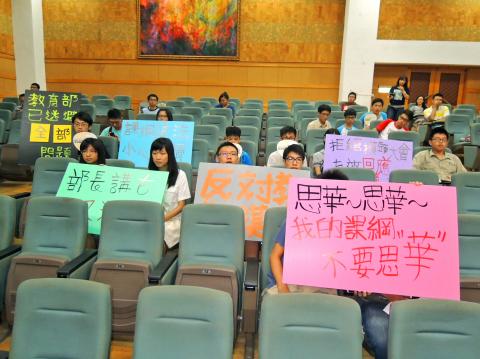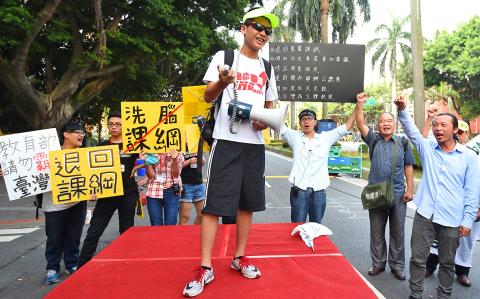Students from the Northern Taiwan Anti-Curriculum Changes Alliance yesterday stormed out of a Ministry of Education sponsored forum in Taipei on controversial adjustments to high-school curriculum guidelines.
Alliance spokesman Brian Sung (宋運川) said that K-12 Education Administration Director Wu Ching-shan’s (吳清山) responses to students’ questions lacked sincerity, with Wu avoiding key issues and deliberately wasting time.
“[Wu] was unable to give an account for why the ministry waited until now to put on the forums, or where in the world Minister [of Education Wu Se-hwa (吳思華)] is,” Sung said.

Photo: Wang Chun-chung, Taipei Times
He rejected offers by Wu Ching-shan to arrange a meeting between student representatives and Wu, saying it was too late.
“We are running out of time, with less than seven days left [before curriculum guidelines take effect],” Sung said. “Books are already printed — talks with us should have taken place two or three months ago.”
Alliance convener Chu Chen (朱震) said that the group intended to “fight a rearguard action” if the curriculum guideline adjustments go into effect next month as planned. While the level of sacrifice individual students were willing to make varied, student activists would continue to express support for any action opposing the curriculum guidelines, he said.

Photo: Liu Hsin-de, Taipei Times
About 40 students had trickled into the auditorium of the Affiliated Senior High School of National Taiwan Normal University to listen to a report on the adjustments by ministry officials, the majority of them alliance students wearing headbands and carrying protest banners and placards.
After the conclusion of the ministry’s report, Wu Ching-shan participated in a question-and-answer session that saw students question what critics call the “China-centric” focus of the changes and an opaque, “black box” approval process.
Forums were simultaneously held at National Hsinchu High School, National Changhua Senior High School and Tainan First High School.
Earlier forums had been canceled after the first forum saw student activists confront Wu Se-hwa, who did not attend any of yesterday’s forums.
Students attended the forum after breaking up their protest outside the Ministry of Education ahead of schedule yesterday morning after being “snubbed” by Deputy Minister of Education Lucia Lin (林思伶).
Lin appeared at the protest site early yesterday to “show concern” for students’ health and safety, having a brief exchange with another alliance spokesman, Wang Pin-chen (王品蓁), before being interviewed by reporters and walking into the ministry building.
Lin said she was sure there would be opportunities for talks with the students in the future, but ruled out on-site talks.
“When students are putting on an event, they often do not think about communicating because they just want to complete the event,” she said.
Lin’s remarks drew an angry response from student protesters.
Wang said that Lin had not stated her identity and had only asked whether a nearby student lying on the ground was sleeping or had “fainted” before walking over to media to be interviewed.
“Our central demand in putting on this event was that a deputy minister would come out for talks,” Chu said.
Given Lin’s unwillingness to engage in dialogue with the students, it was unlikely that their demand for on-site talks would be met and they had decided to save time and energy to participate at the evening forum, he said.
Students had originally planned to continue their protest into the evening.

SECURITY: As China is ‘reshaping’ Hong Kong’s population, Taiwan must raise the eligibility threshold for applications from Hong Kongers, Chiu Chui-cheng said When Hong Kong and Macau citizens apply for residency in Taiwan, it would be under a new category that includes a “national security observation period,” Mainland Affairs Council (MAC) Minister Chiu Chui-cheng (邱垂正) said yesterday. President William Lai (賴清德) on March 13 announced 17 strategies to counter China’s aggression toward Taiwan, including incorporating national security considerations into the review process for residency applications from Hong Kong and Macau citizens. The situation in Hong Kong is constantly changing, Chiu said to media yesterday on the sidelines of the Taipei Technology Run hosted by the Taipei Neihu Technology Park Development Association. With

CARROT AND STICK: While unrelenting in its military threats, China attracted nearly 40,000 Taiwanese to over 400 business events last year Nearly 40,000 Taiwanese last year joined industry events in China, such as conferences and trade fairs, supported by the Chinese government, a study showed yesterday, as Beijing ramps up a charm offensive toward Taipei alongside military pressure. China has long taken a carrot-and-stick approach to Taiwan, threatening it with the prospect of military action while reaching out to those it believes are amenable to Beijing’s point of view. Taiwanese security officials are wary of what they see as Beijing’s influence campaigns to sway public opinion after Taipei and Beijing gradually resumed travel links halted by the COVID-19 pandemic, but the scale of

A US Marine Corps regiment equipped with Naval Strike Missiles (NSM) is set to participate in the upcoming Balikatan 25 exercise in the Luzon Strait, marking the system’s first-ever deployment in the Philippines. US and Philippine officials have separately confirmed that the Navy Marine Expeditionary Ship Interdiction System (NMESIS) — the mobile launch platform for the Naval Strike Missile — would take part in the joint exercise. The missiles are being deployed to “a strategic first island chain chokepoint” in the waters between Taiwan proper and the Philippines, US-based Naval News reported. “The Luzon Strait and Bashi Channel represent a critical access

Pope Francis is be laid to rest on Saturday after lying in state for three days in St Peter’s Basilica, where the faithful are expected to flock to pay their respects to history’s first Latin American pontiff. The cardinals met yesterday in the Vatican’s synod hall to chart the next steps before a conclave begins to choose Francis’ successor, as condolences poured in from around the world. According to current norms, the conclave must begin between May 5 and 10. The cardinals set the funeral for Saturday at 10am in St Peter’s Square, to be celebrated by the dean of the College